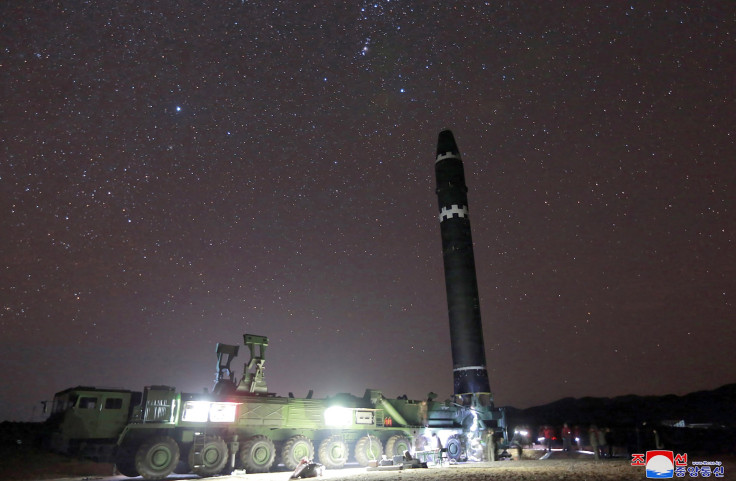North Korea Warns Of 'Mighty Nuclear Force' If US Continues 'Warmongering' Acts

North Korea's foreign ministry said Wednesday the United States and South Korea's military drills and U.S. officials' condemnation of Pyongyang's nuclear and missile programs made the outbreak of war on the Korean peninsula “an established fact.” North Korea's comments came a day after Washington flew a B-1B supersonic bomber over the region, angering the reclusive country.
A spokesman for the North’s foreign ministry blamed “confrontational warmongering” remarks by U.S. officials for pushing the peninsula to the brink of war. He also said the ongoing large-scale aerial drills between Seoul and Washington indicated the U.S. was taking a "step-by-step" approach to provoke a war.
“The remaining question now is: when will the war break out?” the spokesman said Wednesday in a statement carried by North Korea’s official Korean Central News Agency (KCNA). "We do not wish for a war but shall not hide from it and should the U.S. miscalculate our patience and light the fuse for a nuclear war, we will surely make the U.S. dearly pay the consequences with our mighty nuclear force which we have consistently strengthened."
"If the U.S. does not want to be burnt to death by the fire it ignites, it would better behave with prudence and caution," the KCNA added.
South Korea and the U.S. kicked off their five-day joint air force drills, named Vigilant ACE, on Monday amid growing tensions on the Korean peninsula over the Kim Jong Un regime's testing of nuclear and ballistic missiles. The air maneuvers were prepared to simulate strikes on "mock North Korean nuclear and missile targets and transporter erector launchers that move the North's missiles," the South Korean Air Force told Yonhap News Agency.
North Korea fired a new intercontinental ballistic missile, dubbed Hwasong-15, on Nov. 29 and announced the completion of its "nuclear force." The regime claimed that the missile was capable of reaching the U.S. White House national security adviser H.R. McMaster said last weekend the possibility of war with North Korea was “increasing every day.” Following North Korea's latest missile test, the U.S. and South Korea began their military exercises which were largely denounced by Pyongyang.
“Recently, as the U.S. is conducting the largest-ever joint aerial drill on the Korean peninsula targeting the Democratic People’s Republic of Korea, its high-level politicians are showing alarming signs by making bellicose remarks one after another,” the North’s foreign ministry spokesman said, using North Korea’s official name.
“These confrontational war-mongering remarks cannot be interpreted in any other way but as a warning to us to be prepared for a war on the Korean peninsula.”
Despite tough sanctions from the United Nations and condemnation from the international community, North Korea continues to advance its nuclear program. Following the latest test, President Donald Trump threatened to impose "major sanctions" against Pyongyang. Trump's comments were followed by U.N. ambassador Nikki Haley saying the ballistic missile launch "brings us closer to war."
© Copyright IBTimes 2024. All rights reserved.





















